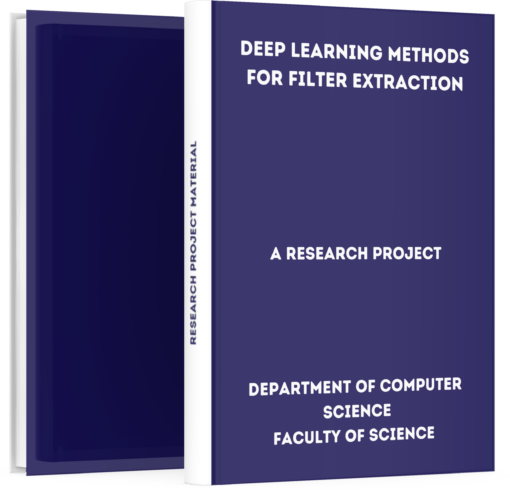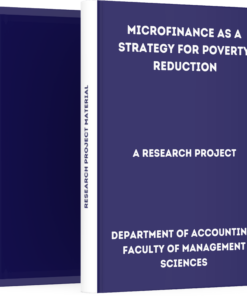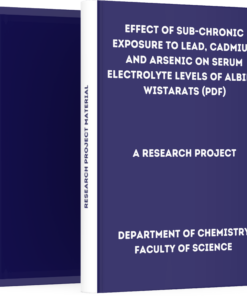Deep Learning Methods for Filter Extraction
₦3,000.00
If you are interested in getting this project material “Deep Learning Methods for Filter Extraction ”, click on the DOWNLOAD BUTTON to make payment and the file will be delivered to your email immediately after confirmation.
Description
– Deep Learning Methods for Filter Extraction –
Download Deep Learning Methods for Filter Extraction. Students who are writing their projects can get this material to aid their research work.
Abstract
With the exponential growth of the information technology, nowadays tremendous amounts of data including images, audio, text and videos, up to millions or billions, are collected for training machine learning models. Deep neural networks (DNNs) are one of the widely used methods today.
Large companies in the uses these methods to recommends buyers with products, filter junk email or text-based hate speeches, understand and translate major languages in real time, and so on.
Inspired by the trend, our work is dedicated to developing and training a deep neural network to extract meaningful patterns from a set of labelled data i.e. making generalizations.
We show that DNNs can learn feature representations that can be successfully applied in a wide spectrum of application domains.
We show how DNNs are applied to classification problems – grading of fresh tomato fruits based on their physical qualities using supervised learning approach.
Introduction
1.1 Background of the Study
Artificial Intelligence (AI) is transitioning from being our daily helper to something much more powerful – and disruptive – as the new machines are rapidly outperforming the most talented of us in many endeavours (Frank, Roehrig, & Pring, 2017).
The branch of AI concerned with the study and design of computer programs that automatically improve with experience is called machine learning or ML.
The applications of machine continue to explode in the recent years in the field of agriculture, ecommerce, health, banking, news, robotics, transportation, weather forecasts, software, industries and many more.
YouTube uses ML algorithms to suggest videos, Facebook fills newsfeeds, Netflix recommends films and Google search auto-completes texts. We probably interact with machines frequently.
They are used in many of the software programs that we use, such as Microsoft’s infamous (and long abandoned) paperclip in Office (maybe not the most positive example), spam filters, voice recognition software, and lots of computer games (Marsland, 2015).
How to Download this Project Material
First, note that we are one of the best and most reliable online platforms because we don’t retain any of your personal information or data as regards making payments online.
PRICE: ₦3,500 ₦3,000 (Three Thousand Naira Only)
Make a bank deposit or mobile transfer of ₦2,000 only to the account given below;
Bank Name: UBA Account Number: 1022564031 Account Name: TMLT PRO SERVICES
After making the payment, CLICK HERE to send the following on WhatsApp;
- Depositor’s Name or Screenshot of Payment
- Name of the Past Question
- Active Email Address
or Call Us On +2348082284439 Once your details have been received and your payment confirmed by us, you will receive the past question in your email or WhatsApp within 5 Minutes.
Guarantee of Getting the Material
We understand that due to the high rate of fraud, many people are afraid of making purchases online but be rest assured that PastExamQuestions will deliver your material after payment.
Once your details have been received and your payment confirmed by us, you will receive the past question in your email or WhatsApp.
Give us Feedback
Have we been able to satisfy you? How well do you think the material will be helpful after having gone through it? Does the price worth the material?
Let’s hear from you! We recommend that our customers give feedback at the end of every transaction to enable us to serve better. You can do this by clicking the review button on this page.
Where is the review button? >> Just scroll up to where you see reviews





Reviews
There are no reviews yet.